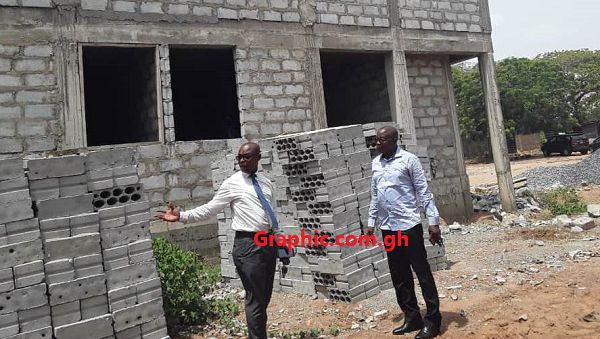
Hostel project at Korle Bu hospital abandoned for lack of funds
Work on a 32-bedroom hostel at the Korle-Bu Teaching Hospital in Accra for parents of childhood cancer patients has stalled due to lack of funds.
The two-storey hostel, when completed, is expected to ease the stress of childhood cancer parents by providing them with accommodation to cater for their children while they undergo regular chemotherapy treatment at the hospital. At the moment, it is only work on the ground floor that is complete.
Briefing the Daily Graphic on state of the project in Accra yesterday, the National Chairman of the Ghana Parents’ Association for Childhood Cancer (GHAPACC), Dr Kwame Aveh, explained that the members of the association could not continue with the project they initiated because of the lack of funds.
He said apart from the First Lady, Mrs Rebecca Akufo-Addo, who donated substantially towards the project, voluntary contributions from members was not enough to complete it.
According to him, the project, estimated to cost $750,000, cannot be completed without support from benevolent organisations and individuals.
Challenges
Dr Aveh said more than 80 per cent of childhood cancer patients at the Korle-Bu Teaching Hospital were referred from other health facilities outside Accra.
“Members of GHAPACC observed and found out that about 30 per cent of parents abandoned treatment after few visits to the hospital, thereby leaving the patients to their fate.
“It also came out that affected families did not abandon treatment because they had lost hope and given up but rather due to lack of money,” he said.
Dr Aveh, a parent of childhood cancer, added that some of the parents also complained about the lack of affordable accommodation and difficulties in transporting their children regularly to the hospital for treatment.
Statistics
Giving statistics on the disease, the Chief Oncology Consultant and a lecturer at the Ghana Medical School, Prof. Lorna Awo Renner, said “out of 80 per cent of children with cancer living in developing countries, only 20 to 30 per cent received treatment.”
She said the survival rate of such children, who received treatment, was usually not more than 20 per cent “because of late presentation, cost to families and treatment abandonment, among other reasons.”
According to Prof. Renner, early reporting was key to the successful cure of such children, stressing that under a United Nations Convention on the Right of the Child, every child had the right to life, treatment of illness, rehabilitation of health and education.
On the way forward, Prof. Renner said there was the need to raise public awareness of the early signs and symptoms of cancer and also set up “treatment centres in the regions for rapid diagnosis and treatment including adequate supportive and palliative care.”
She further advocated the inclusion of some curable cancers in the National Health Insurance Scheme (NHIS) as a show of commitment by the government to fight childhood cancer.
Writer’s Email:
